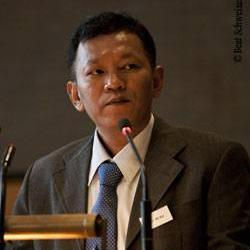Potemkin Judges: Critical Reflections on the Continued Presence of Hong Kong’s Overseas Non-Permanent Judges
- Alvin YH Cheung

- Jul 1, 2024
- 19 min read
Updated: Jun 27, 2025
Introduction
On 30 June 2020, the National People’s Congress Standing Committee (NPCSC) in Beijing imposed its ‘National Security Law’ (NSL) on the Hong Kong Special Administrative Region.[1] Its provisions—drawn up in complete secrecy—criminalise conduct (including conduct outside Hong Kong) that would elsewhere be recognised as ordinary civic and political participation. Under the NSL, the territory is subject to two distinct state security apparatuses—one made up of Hong Kong police, prosecutors, and judges; the other of Mainland Chinese state security agents—neither of which are subject to meaningful legal or democratic accountability. Despite the lip service paid to fundamental rights in Article 4, the content of the NSL[2]—and the way in which it was imposed—conveyed one clear message: any such rights could be abrogated at will.[3]
More than three years after the imposition of the NSL, Hong Kong’s political and legal orders have been transformed beyond recognition. Opposition parties, civil society groups, and independent media have been shut down by a combination of police raids and intimidation; authorities increasingly inveigh against mere expressions of dissent as acts of ‘soft resistance’ threatening ‘national security’.[4] Pro-democracy politicians and activists have been incarcerated, exiled, or otherwise forced out of the public arena. As of 1 July 2023, a total of 264 people have been arrested, and 148 charged, with NSL-related offences or colonial-era sedition offences; of the latter, 70% have been denied bail.[5] Even exiles are not immune from the reach of the NSL: on 3 July 2023, the Hong Kong government announced HK$1M (approximately GBP 104,800) bounties on eight politicians and activists in exile, including barrister and former legislator Dennis Kwok and solicitor Kevin Yam.[6] As I have argued elsewhere,[7] Hong Kong’s post-NSL legal order is now a dual state[8]—one in which the security apparatus is not subject to any legal restraints, and in which the ordinary, ‘normative state’ can be displaced merely by invoking the deliberately nebulous concept of ‘national security’.[9]
All of these developments[10] are a matter of public record. Yet the Hong Kong Court of Final Appeal (‘HKCFA’) continues to boast ten Overseas Non-Permanent Judges (‘overseas judges’), all of whom have held high judicial office in the UK, or in other Commonwealth jurisdictions. More than three years after the NSL was imposed, only three overseas judges have resigned from the HKCFA.[11]
Some of the overseas judges who have chosen to remain[12] have sought to rationalise their continued presence on the HKCFA. Speaking to the Canadian Broadcasting Corporation in 2022, former Canadian Chief Justice Beverley McLachlin asserted that the HKCFA remained ‘completely independent of the regime in Hong Kong’ and that she was not ‘doing anything negative to prop up that regime’.[13] Similarly, Robert French, former Chief Justice of the High Court of Australia, publicly defended the continued presence of Australian judges on the HKCFA, claiming that he supported ‘their commitment to maintaining judicial independence’.[14]
These defences portray Hong Kong’s legal system as the Rechtsstaat (of sorts) they still imagine it to be, rather than the dual state it has become. In particular, they suffer from two inter-related misunderstandings. First, they do not take into account the HKCFA’s decreasing ability—and willingness—to exercise a moderating influence on the post-NSL judiciary. Second, they misapprehend the role and significance of overseas judges on the HKCFA. I consider each in turn below.




